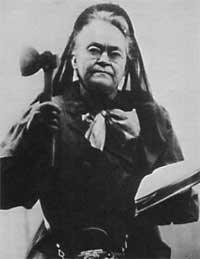Here’s my amateur version of the late William Safire’s long-standing tradition of offering annual predictions. The list for 2013:
1. In 2013, UW-Whitewater will win the following number of national sports championships:
A. None
B. One
C. Two
D. More than two
Adams’s guess: D. More than two. I think three, making 2013 another very good year for the school’s athletics.
Correct answer: D. More than two. Football, women’s gymnastics, and women’s wheelchair basketball. Congratulations to all.
2. The Innovation Express Generac Bus will prove to be
A. A great success
B. A moderate success
C. A failure
D. A failure, and reveal years-long bungling from Janesville Transit
Adams’s guess: D. A failure, and reveal years-long bungling from Janesville Transit. This will prove one grant-chasing mess.
Correct answer: D. A failure…so much so, that the multi-billion dollar corporate beneficiary of the bus publicly disputed Janesville officials’ account even of the program’s origins. There’s more to say about this project in the new year.
3. The Zoning Re-Write initiative will
A. Lead to the collapse of civilization within the city
B. Lead to the collapse of civilization everywhere (as the city is all there really is, after all)
C. Make no progress
D. Be a success
Adams’s guess: D. Be a success. It’s possible to re-write successfully.
Correct answer: Somewhere between C and D, but not a success yet, as it’s still ongoing. So far, though, an attempt to push the committee away from a reformist course proved ineffectual.
4. The Referendum Question ‘Move to Amend’ on the spring ballot will
A. Receive no votes in favor
B. Receive between 5 and 10 votes in favor
C. Win in a close vote
D. Win decisively
Adams’s guess: D. Win decisively. I don’t support the initiative (I think it’s anti-speech), but it will do very well on the ballot.
Correct answer: D. Here was a lopsided win if ever one should see one.
5. The Innovation Center will
A. Prove a huge financial triumph
B. Prove a moderate financial accomplishment
C. Barely chug along
D. Face a financial crisis by 2013 year’s end
Adams’s guess: C. Barely chug along. This is a case of scraping by.
Correct answer: C. There’s more to say about this project in the new year.
6. Whitewater’s plan to combat the Emerald Ash Borer will
A. Be a complete success
B. Be a success justifying the effort
C. Fail
D. Fail completely, with those insects having destroyed all Whitewater’s ash trees, and seizing control of the city’s principal public buildings
Adams’s guess: B. Be a success justifying the effort. There’s no likelihood of complete success in these efforts, but the ad hoc work of residents in 2012 and 2013 will give us a better outcome than many other communities.
Correct answer: B. We’ve fared better than one might have hoped.
7. By year’s end, the amount of vacant commercial space in Whitewater will be
A. Greater than in 2012
B. The same as 2012
C. Slightly less than 2012
D. Far less than 2012
Adams’s guess: C. Slightly less than 2012. I think slightly less, but that will only be evident in the second half of 2013.
Correct answer: C. My rough estimate suggests that we’ve boosted occupancy, and have a slight decline in vacancies.
8. Newspapers serving the Whitewater area will be
A. More in number and more read than ever before
B. The same in number and read about the same as before
C. Fewer in number and less read than before
D. Fewer in number and far less read than before
Adams’s guess: C. Fewer in number and less read than before. If there’s a paywall set up among any of them (and there’s really only one that could even make the attempt), expect overall readership to plummet. This may also be the year one them goes under.
Correct answer: None of these choices – the correct answer would have been ‘the same in number but less read than before.’ Readership is unquestionably down, but we’ve the same number of newspapers.
9. The Whitewater Unified School District’s post-union future will be
A. Mostly uneventful
B. Mostly uneventful, despite efforts from the right to spark controversy
C. Mostly uneventful, despite efforts from the left to spark controversy
D. Contentious
Adams’s guess: B. Mostly uneventful, despite efforts from the right to spark controversy. There’ll be some stirring up of peripheral issues, and those harping on small matters will (predictably) ignore the more important topics of accomplishment and expenditure. We’ll fortunately avoid the sideshow fuss other districts have endured over minor policies.
Correct answer: A. There was no meaningful push here, by left or right, to create a controversy over employee relations, etc. We have escaped, fortunately, the distracting political that have gripped other districts (including Janesville).
10. After spring elections, Whitewater’s Common Council will be
A. More conservative
B. More moderate
C. More liberal
D. There’s still no left or right in Whitewater’s local politics
Adams’s guess: B. More moderate. Over time, the city will become more outwardly ideological, and that change will produce a better politics (of left or right). It will be, however, a gradual process, and with some issues leading to combinations between more modern representatives of the left and right.
Correct answer: B. It’s more moderate.
Not a bad year for guessing, with six of ten correct, and two others partly correct. (Although those two others were partly correct only because the available choices were poorly conceived, so that’s an area for improvement all its own.) Still, a step up from last year’s four-in-ten result.
Tomorrow: Predictions for 2014.

